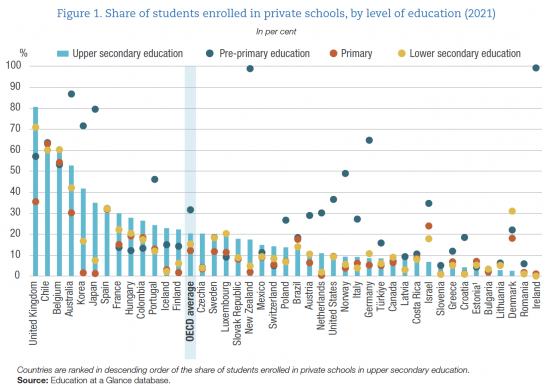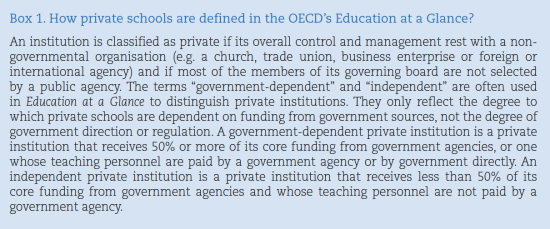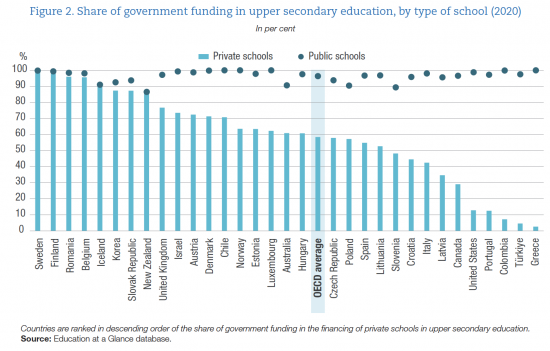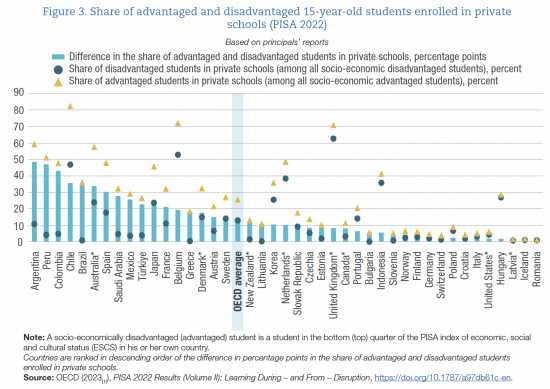I have just noticed a new report published by the Organisation for Economic Cooperation and Development ('OECD') in January this year on the relative roles of state and private education in OECD member states.
This report makes it clear quite how aberrational the UK system is. This is the table of initial findings:
You will note that the UK is the outlier on the left-hand side of the chart, with the majority of education in this country being provided by what the OECD considers to be private-sector educational institutions.
I was, like I suspect many readers of this blog will be, surprised by the suggestion that UK education is dominated by private sector institutions, and so it is important to share the definition that the OECD use to create this distinction between the state and private sectors when it comes to the individual institutions that supply education to young people:

Because UK universities are now very largely free of direct state control, as so many of our schools are as well, with many falling under the management control of churches and trusts, we have education in the UK that is from an objective viewpoint controlled by non-governmental, and so by this definition, private sector organisations.
The OECD made clear in their report that this does not mean that the education supplied is necessarily funded by private resources. In fact, they emphasise the fact that quite large parts of what appears to be private education is, in fact, funded by governments, and this is apparent from the following chart that highlights this obvious contradiction in the UK education system:

As the OECD makes clear, whilst it is true that private sector education tends to achieve higher levels of educational attainment in the many countries where it is unusual, as measured on the PISA scale (the relevance of which I have significant doubts about), this does not necessarily indicate any better educational performance by those institutions. That is because those in private education are likely to enjoy privileges that create a bias towards this outcome. As we know, this is not a conclusion that can be extrapolated to the UK.
Our exceptionalism is also apparent from the OECD's third chart, which makes clear that when it comes to disadvantaged students, the state is much more involved in the supply of education in the UK than it is in most countries. We have a system of what looks like independently managed education that is almost entirely biased towards meeting the needs of those for whom the education system works.

To put this another way: we have, in a fashion that might now be described as typically British, outsourced an essential public service so that private sector institutions might cream off profits and rents (the latter largely in the form of excessive salaries) for delivering totally normal performance when providing unchallenging services whilst leaving all the problems to the state.
This is not an education system. Nor is it an answer to any known social need. It is a means of profit extraction, and we should recognise it as such.
Why is it that we tolerate such absurd abuse in this country? And for how long can that tolerance last?
Thanks for reading this post.
You can share this post on social media of your choice by clicking these icons:
You can subscribe to this blog's daily email here.
And if you would like to support this blog you can, here:



Clearly a neoliberal policy. If schools get £billions in funding, then the private sector has a right to some of that money, claiming that the amount returned is somehow better value than the whole. Their profit is the amount of money that could have fixed the rooves, or ensured that teachers salaries kept up with inflation.
“Why is it that we tolerate such absurd abuse in this country? And for how long can that tolerance last?”
Many past blogs (& the below the lines comments) particularly recent ones, have noted the almost total lack of citizen input into the political process. Couple this to the quasi-privatisation of education – stripping the LEAs of responsibility (itself part of the on-going castration of local democracy/power) – all in the interests of “a market for education” (neoliberalism rules OK!) and you end up with what you have. Education, neoliberalised, ditto many, most local services.
I do hope that all those that voted for the tories (& an aquiescent LINO) over the past couple of decades feel happy with the outcome. UK education is a symptom of everything that is wrong with the UK. That this blog is one of the few to substantively discuss the subject (and allow comment!) is indicative of where the UK is heading.
It’s amazing isn’t how it seems this country has been essentially sold off to create opportunities for the global rich to maintain their wealth.
From what I saw last night, our politics has been privatised too. It does not work – but no matter, it does help the rich and that’s what counts. It matters not that outside my door today, in the rain, puddles are everywhere on under maintained foot paths and roads; the rivers are bursting their banks and lakes that appeared in the fields earlier this year are being topped up.
We are a ‘clients state’ – here to serve you if you’ve loads of money you want to look after.
Knock yourself out and take what you want seems to be the invitation.
I don’t think we know that we tolerate it because no one follows the money like you have done.
Thank you for raising this – it’s very troubling and I think decidedly accurate.
A major part of neoliberalism is to remove public influence over financial matters.
Education spending was a very large share of local government spending, and the removal of local authority control of schools was a major part of the Thatcherite assault on local government, an assault which has led to the current very poor state of local government finances, which are now reeling from the effects of austerity.
Like the privatised railways, various actors are extracting financial benefit from the current academy system, as it was designed to facilitate, but Whitehall calls the shots with respect to the content of the education provided, and it is pretty poor gruel when compared to what the country really needs. We desperately need a revolution in education in this country, but I see little thinking in the majority parties that matches this need.
Thank you, Richard.
Further to recent discussions with Labour, private sector involvement, including, it was implied, vouchers for schools operated by the private sector and private sector influence on the curriculum, is on the agenda.
Richard and readers may be interested in https://www.nakedcapitalism.com/2024/02/michael-hudson-higher-education-crapification-the-new-school-case-study.html.
Soon, it will be easier to say what Labour is not intending to privatise.
Thanks
Pity there is not split for Scotland where primary and secyeduction is still Council run not outsourced to “business” trusts. Pre school is mixed, but still a lot of state provision. This would imply the situation in England is even more of an aberration.
Agreed
For a while I was a school re for the Association of Teachers and Lecturers -usually descried as ‘traditionally moderate’ by the BBC. The ATL was then led by Dr Mary Bousted (who told me circa 2011 she had just met you and was impressed) The ATL produced a lot of documents on aspects of education which were well researched -better than most govt. publications.
She is now with the National Education Union (the ATL merged with the NUT ) and they still produce good research.
IMHO the Opposition parties should look to them for ideas relating to policy. They know what they are talking about.
This is one they produced on Multi- Academy Trusts. They say
Academisation is driving down staff pay, terms and conditions, alienating communities and has caused the fragmentation of the education system.
https://neu.org.uk/advice/your-rights-work/academisation/neu-case-against-academisation
I hope Labour is prepared with a plan to restore , at least, some of these to public ownership.
We did, indeed, meet. The respoect was mutual.
Thank you, Ian.
From my recent engagements with Labour and contrary to what Starmer said at the civil society conference, Labour has told the City that it will be engaged, not civil society, unions etc. Starmer said, “The City is a force for good and Labour has the City’s back.” Reeves said, “Every day, every month and every year of a Labour government, it will maintain its credibility with the markets and relationship with the City.” Labour plans to extend private sector involvement. It’s easier to say where Labour does not plan private sector involvement.
@ Richard: Please tell Mary Bousted to team up with Blair and / or private equity or become a bond trader as she will have more influence that way.
Along with the constant and deliberate underfunding of state education, Private education is one of the major Tory abuses of our supposedly democratic education system, but remarkably, unlike most of the other disasters that have befallen this country in the last forty five years, Thatcherism is not entirely to blame.
The rot really set in during the 1960s when the introduction of the Plowden report resulted in the implementation of Primary school learning by discovery, the Initial teaching alphabet and many other grotesque ideas about numeracy and literacy.
None based on evidence, none based on research and none that worked, they blighted the education and life chances of generations of ordinary children.
Arguably, one of the best things that New Labour ever did was to introduce the Literacy and Numeracy hour, getting rid of most of the nonsense. Certainly, a decade later the 16-18 year olds that I taught showed the benefits.
The fact that an institution is non-profit in no way implies that it is indifferent to money or even that is is less assiduous in pursuing money than are businesses set up to make a profit. In many colleges and universities, junior faculty members cannot expect to be promoted to tenured ranks unless and until they bring in research grants, from which the institution takes a sizable share as overhead charges – on average about 44 per cent on grants fronm the Department of Health and Human Services, for example.
To some extent these overhead charges represent a recovery of investments made earlier in faculty members’ careers. According to the Chronicle of Higher Education, the University of Wisconsin at Madison spends an estimated “$1.2 million in start-up costs for each new professor”. The Chronicle of Higher Education adds:
It typically takes eight years for a professor to bring in enough research money to cover that cost. A professor who stays at Madison for 25 years after earning tenure brings in an average of about $13 million in research money. But the university loses many professors before they even pay off the initial investment
Given the large sums of money that a professor at a leading research university can bring in, it is easy to see why competition for such professors drives their salaries up at such universities, as compared to teaching colleges.
Your point is?
It would be greatly assisted if you did not hide behind a false name.